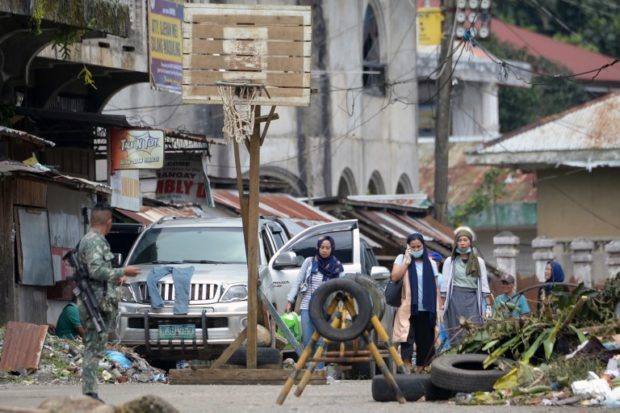Checkpoint passes a must to guard vs terror – AFP

A soldier (L) keeps watch as residents returning to inspect their homes walk past near the battle area of Mapandi in Marawi, on the southern island of Mindanao on October 24, 2017, a day after the military declared the fighting over. AFP
MARAWI CITY — Residents will have a harder time moving around their home city of Marawi after the five-month fighting between government troops and Islamic State-inspired terrorists, who took over a section of the city, ended.
To move around the city, they had to secure a conduct pass, which would allow them to pass through a number of checkpoints that security forces put up around Marawi and on the road leading to neighboring Iligan City.
Renewing passes
Fazniah, 43, a trader from Marantao, a town about 19 kilometers south of here, had to go to Iligan once a week to purchase supplies for her store. This means she had to go to the provincial capitol here and spend at least an hour to renew her checkpoint pass—a piece of paper issued by the military’s Joint Task Force Ranao that contained her name, her destination and the purpose of her travel.
Because Fazniah travels with her husband, Camad, who drives their family car, she also had to list her husband and the car’s details such as its make, type and plate number on the checkpoint pass request.
Article continues after this advertisementThe pass that Fazniah would eventually get had a validity of two days. Without it, she and Camad would not get past the first checkpoint between this city and Saguiaran town.
Article continues after this advertisement“Sometimes, I felt burdened by having to get a pass every time we go to Iligan. I have to line up for about an hour before we could renew ours,” Fazniah said.
Like Fazniah, Amanoding, an employee of the provincial government here, also had to secure a checkpoint pass before he could go home to Balo-i in Lanao del Norte province.
“Without this, the soldiers at the checkpoints would not allow me to pass,” he said.
Amanoding’s pass would last for 15 days as he had to go home twice a week.
No exemption
Even government employees involved in various activities such as relief operations, cleanup drives or simple marketing tasks in Iligan City also had to secure passes in the form of access identification cards.
“I myself had to get an ID,” said Saripada Pacasum, head of the Lanao del Sur disaster risk reduction and management office.
Col. Romeo Brawner Jr., deputy commander of the Joint Task Group Ranao, said the military would continue to require the presentation of checkpoint passes or access IDs for individuals traveling to and from towns around Lake Lanao, especially if they had to pass by the city.
Brawner said even Marawi residents, who continued to live in communities unaffected by the fighting, such as areas around Mindanao State University, also had to secure passes.
“This is to ensure that individuals traveling to this city and areas around it have legitimate purposes. It is also one way of ensuring that no terrorists will be able to move into, out of, or around the city,” he said.
Brawner said no one was exempted from getting checkpoint passes and assured that securing these passes was not difficult.